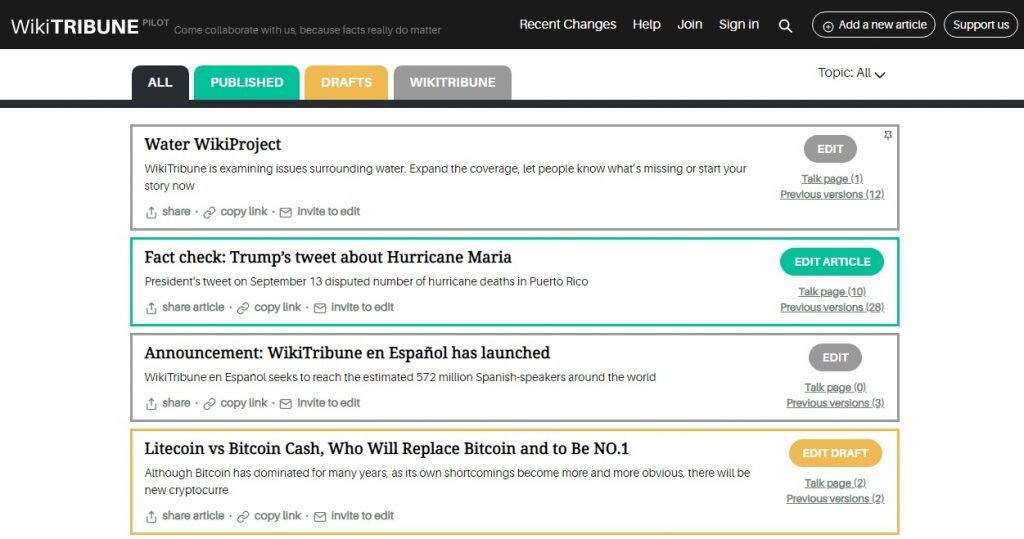El español periodico wikipedia
the spaniard or the spaniard
In 2014, Pedro J. Ramírez was dismissed as director of El Mundo,[7] leaving Unidad Editorial, the publishing group of the newspaper he himself founded in 1989. Ramírez decided to embark on a new adventure linked to the journalistic sector. To this end, he fully dedicated the 5.3 million euros net received from his dismissal as director to the project.[8] However, this diversification is controversial.
However, this diversification is controversial insofar as Pedro J. decided that this new project would be outside the IBEX 35 companies. Companies that are clients in terms of branded content.[26] The following is an example of this.
the world
Soledad Gallego-Díaz, José Yoldi, Alicia Rivera, Gorka Lejarcegui, Juan José Millás, Javier Marías, Rosa Montero, Elvira Lindo, Mario Vargas Llosa, Manuel Vicent, Manuel Rivas, Josep Ramoneda, Ramón LoboISSN
In 2010 the U.S. conglomerate Liberty Acquisition Holdings (which is listed on the New York Stock Exchange), took over PRISA and therefore El País.[18] Also in this period, Bank of America and Deutsche Bank became shareholders of PRISA. This fact contributed to a change in the political alignment of El País.
On May 12, 2018, El País announced the creation of the gender correspondent’s office, whose head will be Pilar Álvarez. The objective will be to «plan and improve coverage… on issues related to equality and women.»[37] The new office will also be in charge of the gender correspondent’s office.
At its foundation, it was defined as an independent newspaper, of quality, with a European vocation and defender of pluralist democracy, being considered a reference for both the left and the center-left. El País has shown an editorial line close to the PSOE, with social-democratic tendencies.[49] Since its acquisition by the PRISA Group, it has undergone ideological changes, shifting from socialist positions to an editorial line closer to the center or center-right.[citation needed].
la razón diary wikipedia
Originally, a diary was understood as a record of the most important events or occurrences in a person’s life (intimate diary), or a record of incidents and news (ship’s log or ship’s logbook
[1] for example, the timely one written by Christopher Columbus on his first voyage to America[2]). And one of the most representative and oldest examples is the Journal d’un bourgeois de Paris (Diary of a bourgeois of Paris),[3] once kept by a Parisian between 1405 and 1431, and then continued by another until 1449.
It is precisely from this improved form of presentation and arrangement that the concept of newspaper arises in its most modern meaning, as a paper support containing information and data corresponding to a certain period, and thus replacing the terms gazette and gazette in part of the uses.[4][5][6] In the course of the 18th century, the concept of newspaper arises in its most modern meaning, as a paper support containing information and data corresponding to a certain period, thus replacing the terms gazette and gazette in part of the uses.
Throughout the 18th century, daily journalism emerged. The first of this type was the Daily Courant (1702-1735), which introduced advertising in its editions; and the second with daily issues was the Diario Noticioso[8] (Madrid, 1758). However, the daily periodicity would not be affirmed until the beginning of the 19th century.
the spanish restaurant
In 2014, Pedro J. Ramírez was dismissed as director of El Mundo,[7] leaving Unidad Editorial, the publishing group of the newspaper he himself founded in 1989. Ramírez decided to embark on a new adventure linked to the journalistic sector. To this end, he fully dedicated the 5.3 million euros net received from his dismissal as director to the project.[8] However, this diversification is controversial.
However, this diversification is controversial insofar as Pedro J. decided that this new project would be outside the IBEX 35 companies. Companies that are clients in terms of branded content.[26] The following is an example of this.
Relacionados

Bienvenid@ a mi blog, soy Octavio Pérez Alonso y te ofrezco noticias de actualidad.

Comments are closed